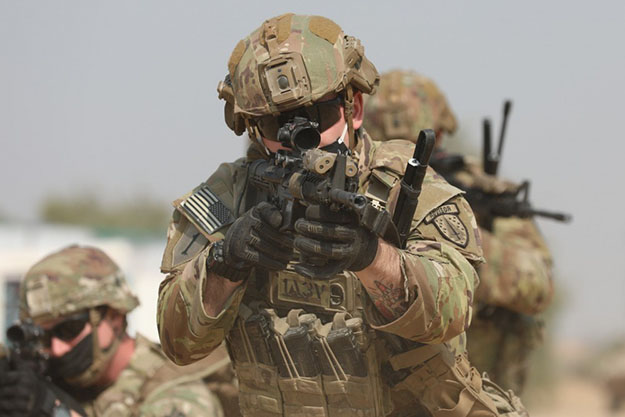WASHINGTON - Since activating last year, the 5th Security Force Assistance Brigade (SFAB) has already employed teams three times to the Indo-Pacific region, and according to its commander, the brigade's schedule will only get busier, with a third of the unit overseas at all times.
Now fully operational, not only is over 30 percent of the brigade's roughly 820 soldiers employed, but the remaining soldiers are continuously preparing for tasks in the region, said Brig. Gen. Curt Taylor, commander of the 5th SFAB.
Like with other SFAB units, the combat advisors fall under a regional deployment model. Since they are stationed out of Joint Base Lewis-McChord, the 5th SFAB is duty-bound to the Indo-Pacific.
To date, elements from the 5th SFAB have been on the ground to work with partners in Thailand, India, and Indonesia, and have plans to maneuver to other countries down the road, Taylor told reporters Feb. 24, as part of an Army Current Operations Engagement Tour.
Because of operational security, the general wasn't able to specify which countries were on the horizon, or where teams currently were. However, Taylor said, "rather than listing off countries (interested in working with the Americans), I'd like to say there is a lot of interest."
The 5th SFAB is composed of vetted volunteers, with each carefully selected member holding the rank of sergeant or above. "The key is getting the right people into our organization. Then organizing them into small teams and forward deploying them into areas we have strategic interests in," Taylor said.
Once selected, the soldiers are placed into independently deployable, small teams and are led by an Army captain. Each team ranges in size, from four to 12 members, and specializes in various conventional areas like logistics, communications, maneuver, medical, engineering, and field artillery.
It's those wide-ranging, Army conventional skills that soldiers both train their foreign counterparts in and brush up on while at home, said Lt. Col. Anthony Gore, a battalion commander for the brigade.
"Leaders in our formations can take the time and use the opportunity to train up on specific operations, those skills, and then bring that to the partnership," Gore said.
"The secret sauce (for the 5th SFAB) is the quality of the people we recruit into the organization," Taylor said. "We are hiring experienced junior leaders who have proved themselves in the conventional force, their capability to operate inside our brigade combat teams, and employing them in small teams at the center of strategic competition."
It comes as no surprise that the 5th SFAB has cherry-picked a few of the Army's best. During any deployment, advisors of all ranks may find themselves tasked with a job that may seem out of their league.
For example, during their most recent rotation to India earlier this year, Taylor said the Indian military was surprised to see an Army staff sergeant teaching a class on intelligence gathering to over 250 Indian officers and soldiers, including an Indian brigadier general and his staff.
The foreign allies were impressed with how empowered the team's noncommissioned officers were, he said.
Besides intelligence, the 5th SFAB also helped their allies in other areas, like artillery and unmanned aerial vehicles. In return, the Indian soldiers helped the Americans sharpen their skills in high-altitude warfare in Kashmir.
Also during the trip, the team leader briefed senior-level military officers, national-level officials from the Indian government, and officials from the American embassy. But communicating with officials at this level is part of the job, Taylor said.
"The other day, we addressed the chief of the Indonesian army," he said. "(Our soldiers) are having a strategic impact, so we've got to pick the right people."





Read Comments